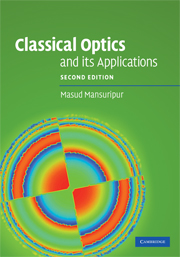Book contents
- Frontmatter
- Contents
- Preface to the second English edition
- Preface to the first edition
- Introduction
- 1 Abbe's sine condition
- 2 Fourier optics
- 3 Effect of polarization on diffraction in systems of high numerical aperture
- 4 Gaussian beam optics
- 5 Coherent and incoherent imaging
- 6 First-order temporal coherence in classical optics
- 7 The van Cittert–Zernike theorem
- 8 Partial polarization, Stokes parameters, and the Poincaré sphere
- 9 Second-order coherence and the Hanbury Brown–Twiss experiment
- 10 What in the world are surface plasmons?
- 11 Surface plasmon polaritons on metallic surfaces
- 12 The Faraday effect
- 13 The magneto-optical Kerr effect
- 14 The Sagnac interferometer
- 15 Fabry–Pérot etalons in polarized light
- 16 The Ewald–Oseen extinction theorem
- 17 Reciprocity in classical linear optics
- 18 Optical pulse compression
- 19 The uncertainty principle in classical optics
- 20 Omni-directional dielectric mirrors
- 21 Linear optical vortices
- 22 Geometric-optical rays, Poynting's vector, and the field momenta
- 23 Doppler shift, stellar aberration, and convection of light by moving media
- 24 Diffraction gratings
- 25 Diffractive optical elements
- 26 The Talbot effect
- 27 Some quirks of total internal reflection
- 28 Evanescent coupling
- 29 Internal and external conical refraction
- 30 Transmission of light through small elliptical apertures
- 31 The method of Fox and Li
- 32 The beam propagation method
- 33 Launching light into a fiber
- 34 The optics of semiconductor diode lasers
- 35 Michelson's stellar interferometer
- 36 Bracewell's interferometric telescope
- 37 Scanning optical microscopy
- 38 Zernike's method of phase contrast
- 39 Polarization microscopy
- 40 Nomarski's differential interference contrast microscope
- 41 The van Leeuwenhoek microscope
- 42 Projection photolithography
- 43 Interaction of light with subwavelength structures
- 44 The Ronchi test
- 45 The Shack–Hartmann wavefront sensor
- 46 Ellipsometry
- 47 Holography and holographic interferometry
- 48 Self-focusing in nonlinear optical media
- 49 Spatial optical solitons
- 50 Laser heating of multilayer stacks
- Index
- References
19 - The uncertainty principle in classical optics
Published online by Cambridge University Press: 31 January 2011
- Frontmatter
- Contents
- Preface to the second English edition
- Preface to the first edition
- Introduction
- 1 Abbe's sine condition
- 2 Fourier optics
- 3 Effect of polarization on diffraction in systems of high numerical aperture
- 4 Gaussian beam optics
- 5 Coherent and incoherent imaging
- 6 First-order temporal coherence in classical optics
- 7 The van Cittert–Zernike theorem
- 8 Partial polarization, Stokes parameters, and the Poincaré sphere
- 9 Second-order coherence and the Hanbury Brown–Twiss experiment
- 10 What in the world are surface plasmons?
- 11 Surface plasmon polaritons on metallic surfaces
- 12 The Faraday effect
- 13 The magneto-optical Kerr effect
- 14 The Sagnac interferometer
- 15 Fabry–Pérot etalons in polarized light
- 16 The Ewald–Oseen extinction theorem
- 17 Reciprocity in classical linear optics
- 18 Optical pulse compression
- 19 The uncertainty principle in classical optics
- 20 Omni-directional dielectric mirrors
- 21 Linear optical vortices
- 22 Geometric-optical rays, Poynting's vector, and the field momenta
- 23 Doppler shift, stellar aberration, and convection of light by moving media
- 24 Diffraction gratings
- 25 Diffractive optical elements
- 26 The Talbot effect
- 27 Some quirks of total internal reflection
- 28 Evanescent coupling
- 29 Internal and external conical refraction
- 30 Transmission of light through small elliptical apertures
- 31 The method of Fox and Li
- 32 The beam propagation method
- 33 Launching light into a fiber
- 34 The optics of semiconductor diode lasers
- 35 Michelson's stellar interferometer
- 36 Bracewell's interferometric telescope
- 37 Scanning optical microscopy
- 38 Zernike's method of phase contrast
- 39 Polarization microscopy
- 40 Nomarski's differential interference contrast microscope
- 41 The van Leeuwenhoek microscope
- 42 Projection photolithography
- 43 Interaction of light with subwavelength structures
- 44 The Ronchi test
- 45 The Shack–Hartmann wavefront sensor
- 46 Ellipsometry
- 47 Holography and holographic interferometry
- 48 Self-focusing in nonlinear optical media
- 49 Spatial optical solitons
- 50 Laser heating of multilayer stacks
- Index
- References
Summary
In the classical electromagnetic theory the wave-vector k = (2π/λ)σ underlies the Fourier space of propagating (or radiative) fields. The k-vector combines into a single entity the wavelength λ and the unit vector σ that signifies the beam's propagation direction. The Fourier transform relation between the three-dimensional space of everyday experience and the space of the wave-vectors (the so-called k-space) gives rise to relationships between the two domains analogous to Heisenberg's uncertainty relations.
Considering that in quantum theory the electromagnetic k-vector is proportional to the photon's momentum (p = ħk, where ħ = h/2π, h being the Planck constant), one should not be surprised to find relationships between dimensions of a beam in the X Y Z-space and its momentum spread in the k-space. Such relationships impose fundamental limits on the ability of measurement systems to determine the various properties of electromagnetic fields.
In this chapter we address two problems that have widespread applications in optical metrology, spectroscopy, telecommunications, etc., and discuss the constraints imposed by the uncertainty principle on these problems. The first topic of discussion is the separation of two overlapping beams of identical wavelength having slightly different propagation directions. This will be followed by an analysis of the limits of separating co-propagating beams having slightly different wavelengths.
Angular separation and the limit of resolvability
Figure 19.1 shows an aperture of diameter D, which transmits two plane waves of the same wavelength λ propagating in slightly different directions.
- Type
- Chapter
- Information
- Classical Optics and its Applications , pp. 258 - 273Publisher: Cambridge University PressPrint publication year: 2009



